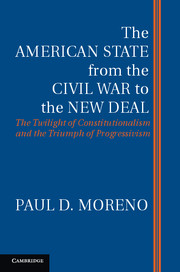 The American State from the Civil War to the New Deal
The American State from the Civil War to the New Deal Book contents
- Frontmatter
- Contents
- Abbreviations Used in the Footnotes
- Acknowledgments
- Introduction
- Part I The Old Regime
- Part II Early Progressivism
- 4 The New Jurisprudence
- 5 The Due Process Dialectic
- 6 Toward a Federal Police Power
- 7 Rooseveltian Progressivism
- 8 The Lochner Incident
- 9 Court and Constitution in Crisis
- 10 Taft and the Republican Crackup
- Part III Late Progressivism
- Part IV The New Deal
- Appendix A
- Appendix B
- Primary Sources
- Index
- References
10 - Taft and the Republican Crackup
Published online by Cambridge University Press: 05 May 2013
- Frontmatter
- Contents
- Abbreviations Used in the Footnotes
- Acknowledgments
- Introduction
- Part I The Old Regime
- Part II Early Progressivism
- 4 The New Jurisprudence
- 5 The Due Process Dialectic
- 6 Toward a Federal Police Power
- 7 Rooseveltian Progressivism
- 8 The Lochner Incident
- 9 Court and Constitution in Crisis
- 10 Taft and the Republican Crackup
- Part III Late Progressivism
- Part IV The New Deal
- Appendix A
- Appendix B
- Primary Sources
- Index
- References
Summary
THE NEW NATIONALISM
Croly provided the slogan “the New Nationalism” for Roosevelt’s 1912 campaign, which split the Republican Party and elected Woodrow Wilson. Croly mostly amplified or echoed Roosevelt’s increasingly progressive ideas, especially those of his last two annual messages to Congress. To his congressional foes, Roosevelt called for greater concentration of power in the federal government, observing that “the danger to American democracy lies not in the least in the concentration of administrative power in responsible and accountable hands. It lies in having the power insufficiently concentrated, so that no one can be held responsible to the people for its use.” He denounced the Court’s “academic theory about ‘freedom of contract’” as frustrating necessary social reform. Turning Sir Henry Maine on his head, he argued that “Progress in civilization has everywhere meant a limitation and regulation of contract.” Though he defended the judiciary in general against attacks by labor leaders, it was because their irresponsible attacks made salubrious judicial reform less likely. Too many judges, he said, had not kept up with new social and economic conditions, and defended “a merely academic ‘liberty,’ the exercise of which is the negation of real liberty.” Twentieth-century democracy needed “judges who hold to a twentieth century economic and social philosophy and not to a long outgrown philosophy, which was itself the product of primitive economic conditions.” William Jennings Bryan congratulated the President on his call for court-curbing. Privately, Roosevelt noted the unique power of the judiciary, which was sometimes abused.
- Type
- Chapter
- Information
- The American State from the Civil War to the New DealThe Twilight of Constitutionalism and the Triumph of Progressivism, pp. 113 - 126Publisher: Cambridge University PressPrint publication year: 2013


